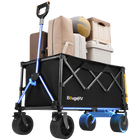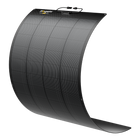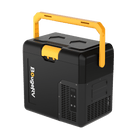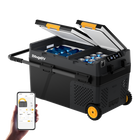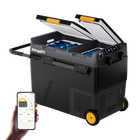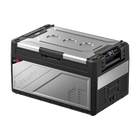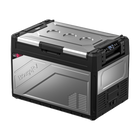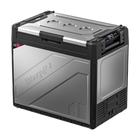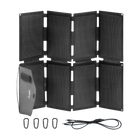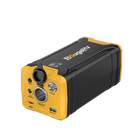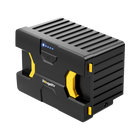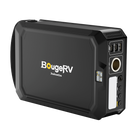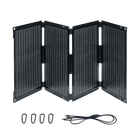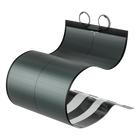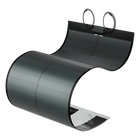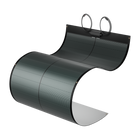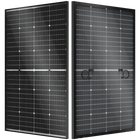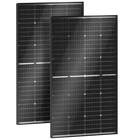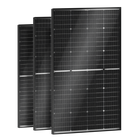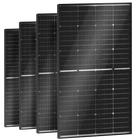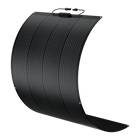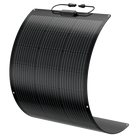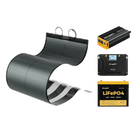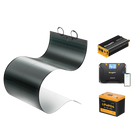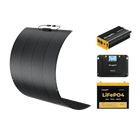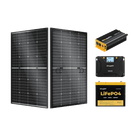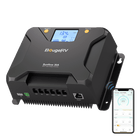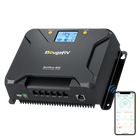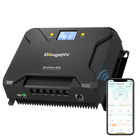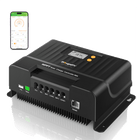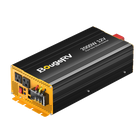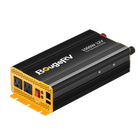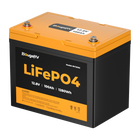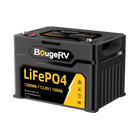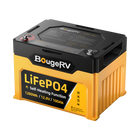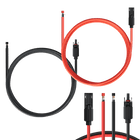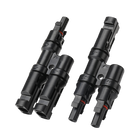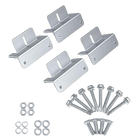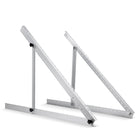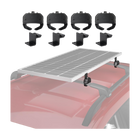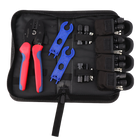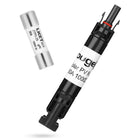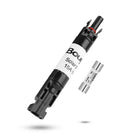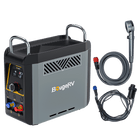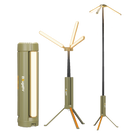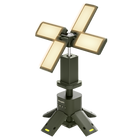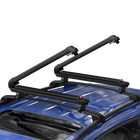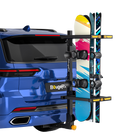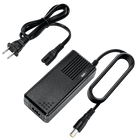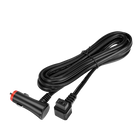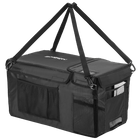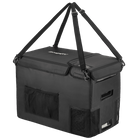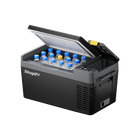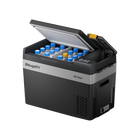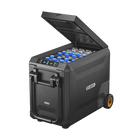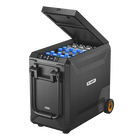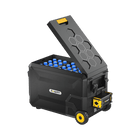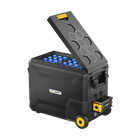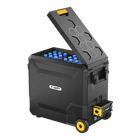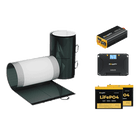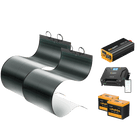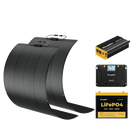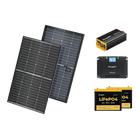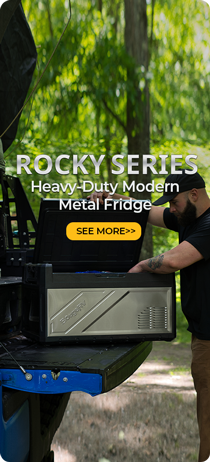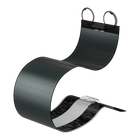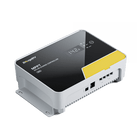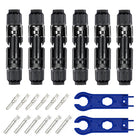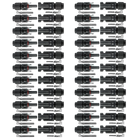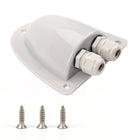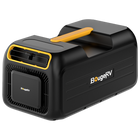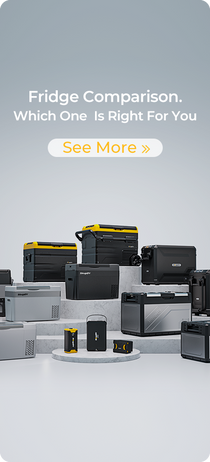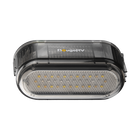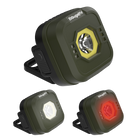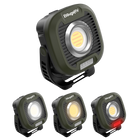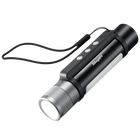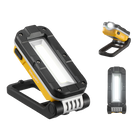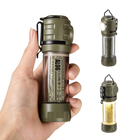Are 48V Off-Grid Solar Systems the Future of Solar Energy?


Solar power is becoming increasingly commonplace – not only for those living off the grid but also for individuals looking for cleaner, more affordable ways to power their homes. But the industry is constantly evolving, and it’s difficult to keep up with the latest theories and technologies.
One idea that’s been gaining steam recently is the concept of the 48V off-grid solar system. We put together this article to explain why the concept could matter to you and discuss whether it could be the future of solar energy.
Let’s get into it.
- Understanding Off-grid Solar Systems
- What Is a 48V Off-Grid Solar System and Why Would You Want One?
- 48v vs. 12v: Pros and Cons
- How to Build a 48V Off-Grid Solar System?
- Are 48V Systems the Future of Off-Grid Solar?
- Summary of 48V Off-Grid Solar Systems
- 48V Off-Grid Solar System FAQs
Understanding Off-grid Solar Systems

Before diving into the concept of a 48-volt battery, it’s worth first reviewing what off-grid solar systems are and how they work.
An off-grid solar system lets you power your home, RV, cabin, or plot of land with solar energy. This makes your home self-sufficient and gives you access to reliable power without forcing you to connect to a utility grid to get it.
The process looks something like this:
-
Your solar panels collect the sun and convert it into usable energy.
-
That energy gets fed into the appliances and electronics that you use during the day.
-
Any excess energy your solar panels generate is stored in a battery.
-
You can draw power from this battery at night to continue accessing the power you need even when the sun isn’t shining.
When you see the phrase 48V off-grid solar system, it’s referencing the type of battery that the system is using. The kind of battery you use in your off-grid system can have a big impact on how much usable energy you’re able to store and the types of appliances you can use. It also impacts safety. But we’ll cover this in more detail throughout the rest of the article.
What Is a 48V Off-Grid Solar System and Why Would You Want One?
The traditional off-grid solar system uses a 12-volt battery to power standard 12-volt appliances. But that may not be enough energy for your needs. One way to increase the output of your solar system is by adding more batteries to it so that you can store and subsequently use more power on a daily basis.
48V off-grid solar systems are one way to add more batteries to your off-grid system. It involves connecting your batteries in a series formation instead of a parallel one. The reason for this is that it allows you to increase your voltage without increasing amperage. That makes it safer to add more batteries to your off-grid system so you get the power you want without increasing your risk.
48v vs. 12v: Pros and Cons

The differences between 48V and 12V off-grid systems can be a bit complicated, but the pros and cons of the two systems are pretty clear. We cover the advantages of each option below to help you get a sense of which type of system may be right for your needs.
48V Systems Are Safer
One of the main advantages of 48V systems is that they can run more appliances more safely. That’s because they push less amps through the wiring of your system. It ends up letting you link more batteries together to increase power without raising the current of the system, which is what increases the risk of dangerous system failures.
48V Systems Are More Efficient
Another advantage of 48V systems is that they’re more efficient than their 12V counterparts. They let you get up to a higher voltage so that you can run full-power appliances with more intense power demands. 12V systems are not always able to run these appliances at full power safely.
48V Systems Are More Scalable
Another factor to consider is that 48V systems tend to be more scalable than 12V options. This is, once again, due to the lower current running through your wiring on a 48V system. It allows you to add more batteries to the system safely so you can keep increasing your output to meet your needs without increasing your risks.
12V Systems Are Easier
48V systems offer several meaningful advantages, but 12V systems have their own positives to consider. For example, with a 12-volt system, you can connect appliances directly to your DC battery bank. There aren’t many 48-volt appliances available, which means you typically need a converter to run a 48V system.
12V Systems Are More Affordable
Because you need to purchase a converter to run a 48V system, the costs of setting one up can be more expensive. Converters typically aren’t the most expensive part of creating an off-grid solar system, so the cost increase may be small enough to warrant upgrading to a 48V system, but it’s worth keeping in mind if you have a strict budget.
How to Build a 48V Off-Grid Solar System?
There are two main options if you want to build a 48V off-grid solar system. The first option is to purchase a ready-made 48V off-grid solar kit. These are easy, as they typically come with everything you need to set up the system and clear instructions you can follow based on the specific components included in the kit.
The alternative is to buy everything you need separately and set it up on your own. That can be a bit more complicated, but it’ll likely save you some money. BougeRV sells portable power stations, solar panels, and solar starter kits that may be a good fit for your needs regardless of which strategy for creating a 48V off-grid solar system you choose to pursue.
Are 48V Systems the Future of Off-Grid Solar?
There are some who say that 48V solar systems are the future of off-grid solar power. The reason they give for this is the fact that 48V systems are more efficient and safer than their 12V counterparts – especially for those who are looking to increase the power output of their off-grid system.
However, it remains to be seen whether or not 48V systems will supplant 12V systems anytime soon. 12-volt systems work with more appliances and are easier to use. There’s reason to believe that they will remain the dominant option moving forward until more appliance companies start creating appliances and electronics that are compatible with 48V power systems.
Put simply, you probably don’t need to worry about upgrading just yet. But, if you’re interested in increasing the output of your off-grid solar energy system, then investing in a 48V system could make sense.
Summary of 48V Off-Grid Solar Systems
48-volt off-grid solar energy systems have a lot of advantages, including improved efficiency and safety. But they’re a bit more complicated to set up than 12V systems and may cost more as well.
Whether you decide a 12-volt or 48-volt system is better for your off-grid applications, BougeRV can provide the batteries and solar panels you need to get started. Take a look at our shop to learn more about how we can help.
48V Off-Grid Solar System FAQs
1. What Is a 48V Off-Grid Solar System?
A 48V off-grid solar system is a way to store energy generated from solar panels. It uses several batteries connected in a series formation instead of a parallel one. The advantage of this is increased efficiency and power output without a corresponding increase in the risk of potentially dangerously damaging the system.
2. How Much Does It Cost to Set Up a 48V System for Off-Grid Solar?
The exact cost of setting up a 48V system will likely be between $1,500 and $3,000. It depends on the type of solar panels and batteries you purchase and how much these cost, as they are the main expenses. You also may need to buy a converter and wiring, depending on your setup.
3. Are 48V Systems Better Than 12V for Off-Grid?
48V systems are more efficient and safer to use than 12V systems when outputting large amounts of power. But they’re more expensive and complicated, meaning you probably only want to use a 48V option if your needs call for one.
4. Are 48V Off-Grid Solar Systems Safer?
Yes, 48-volt off-grid solar systems are safer than 12-volt systems that use the same number of batteries. This has to do with how the batteries are connected together, which keeps amperage the same while increasing output.


